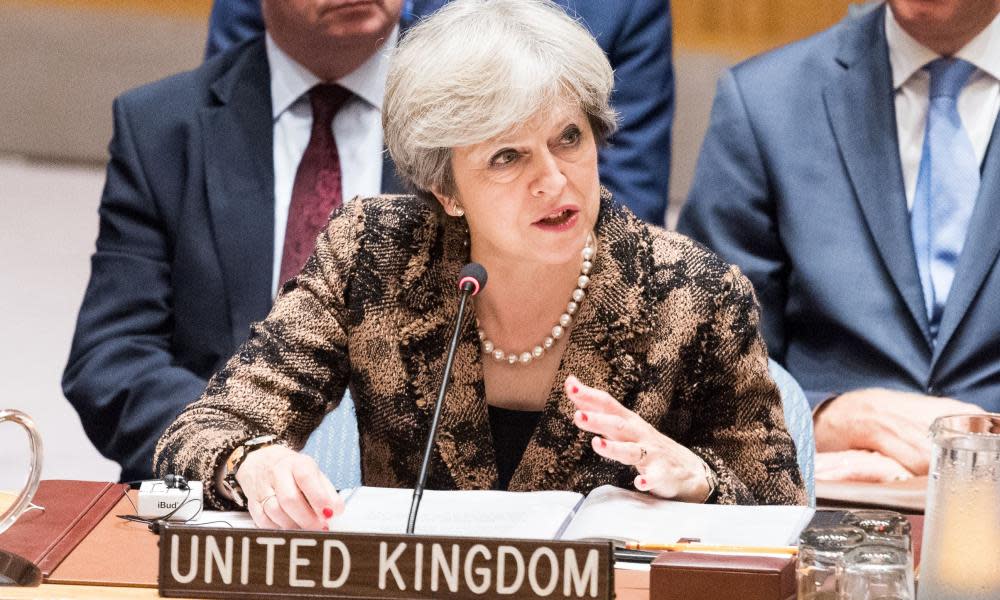From Eurosceptic to 'our home': May treads a well-worn path of EU speeches

Theresa May, in travelling to Florence to deliver her speech setting out her vision of a new Anglo-European relationship, is treading a path that many prime ministers have felt compelled to travel.
A clutch of grand European venues – the College of Europe in Bruges, the University of Leiden, the Royal Castle in Warsaw, the University of Zurich, and even the European parliament – have played host to a British premier determined to deliver a landmark speech explaining how Europe must adapt to reach an enduring settlement with the UK.
These pilgrimages, charting the course of UK-EU history, have at best produced chequered results. Not only did many of these speeches not garner the intended reaction, either in Britain or Europe, but the judgment of history has not been kind to many of their assertions about the future.
Perhaps the most famous of those speeches was by Margaret Thatcher in Bruges in September 1988 – often seen as the moment the Conservative party ceased to be the party of Europe in British politics. In the words of the Thatcher Foundation, that was the point when the party “moved fitfully, by lurches, lunges and sidesteps to a position known as Euroscepticism”.
The speech was intended, according to Thatcher’s closest aides, to be seen as positive about Europe and enlargement. But it became the subject of a drafting war between Thatcher’s key aide Charles Powell in No 10 and John Kerr, the Foreign Office permanent secretary.
Lord Kerr thought he had largely won the battle, writing in an internal memo: “It looks as if our damage limitation exercise is heading for success. While it isn’t going to pick up many tricks across the Channel, I don’t think that the Bruges speech is now likely to cause trouble with Community partners.”
Yet one phrase came to be remembered, partly due to the spin of Thatcher’s press secretary Bernard Ingham: “We have not successfully rolled back the frontiers of the state in Britain, only to see them reimposed at a European level with a European super-state exercising a new dominance from Brussels.”
In his memoirs, Geoffrey Howe, the foreign secretary saw the speech as the turning point. “It was, I imagined, a little like being married to a clergyman who had suddenly proclaimed his disbelief in God.”
The next oratorical foray into Europe was a speech by John Major in Leiden in September 1994 that rattled the Franco-German cage, saying “enthusiasm for Europe is on the wane”.
It was largely designed to warn against talk of a “hardcore”, inner and outer circles, two-tier Europe. Major said: “If we try to force all European countries into the same mould we shall end up cracking that mould. There is not, and should never be, an exclusive hardcore of countries or of policies. I recoil from ideas for a union in which some would be more equal than others.” Largely the same idea is on the EU reformers’ agenda at present.
Tony Blair, strongly pro-European, twice chose Warsaw in 2000 and 2003 to set out his plan for Europe. In his first speech at the Stock Exchange in 2000, he urged that the former countries of the Soviet Union should be allowed into an enlarged EU by 2004, which took place.
He tried to keep up with the gathering debate launched by the German foreign minister Joschka Fischer and French president Jacques Chirac calling for a European constitution. In a bid to offer counter ideas, rather than vetoes, he proposed a second European parliament of national MPs.
But he promised the UK would make the case for European reform as committed Europeans. “As Europe grows stronger and enlarges, there would be something truly bizarre and self-denying about standing apart from the key strategic alliance on our doorstep.”
He returned to Warsaw in 2003 again to urge Britain to engage, saying a new Europe could be forged. “The belief that Europe is something done to us, that everyone else spends their time ganging up on us, is a belief fit for a nation with an inferiority complex, not a proud nation that knows it can win and has proven its courage and its confidence by its record in history.”
But by June 2005, in a speech to the European parliament, his mood had darkened. Reflecting on the Dutch and French rejection of a new EU constitution, he said the constitutional debate had not brought the European ideal closer to the people, as had been intended.
In a warning about the populist tide ahead, he warned “hard questions” were being posed of political leaders by their electorates about living standards, globalisation and the breakup of their communities.
Gordon Brown, with Ukip on the march, also went to Strasbourg as prime minister in 2009 in the shadow of the financial crash to claim European values would save the world from protectionism. It was the most pro-European and least challenging speech in the series. “Today there is no old Europe, no new Europe, no east or west Europe. There is only one Europe … Our home, Europe.”
On Friday, it falls to May to explain why Europe is no longer Britain’s home, and how it will depart.

 Yahoo News
Yahoo News 
